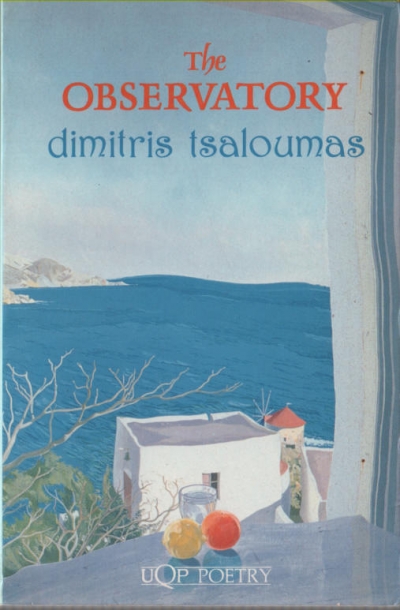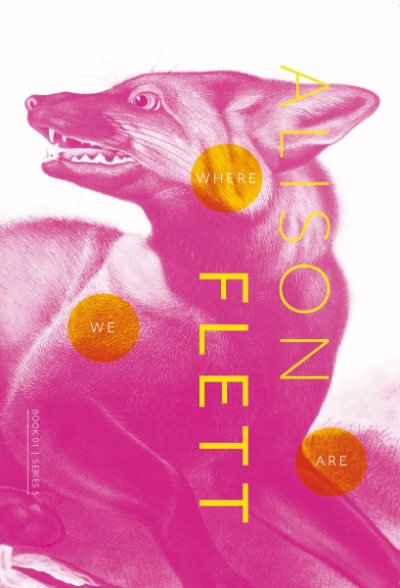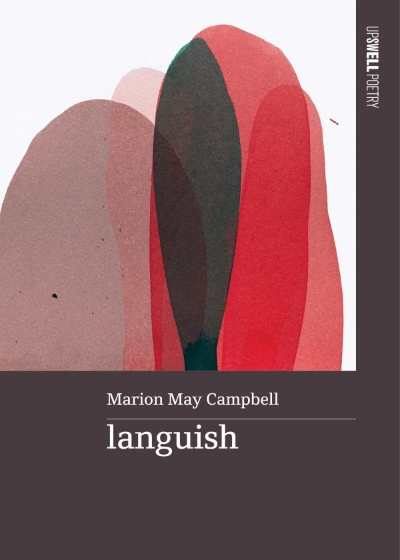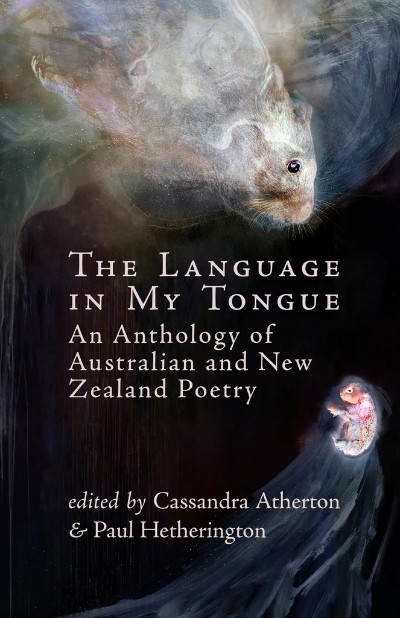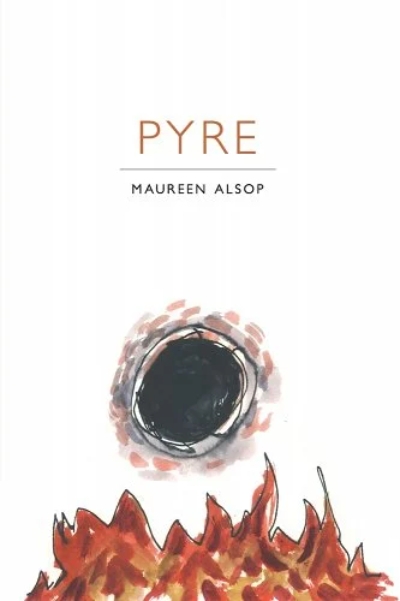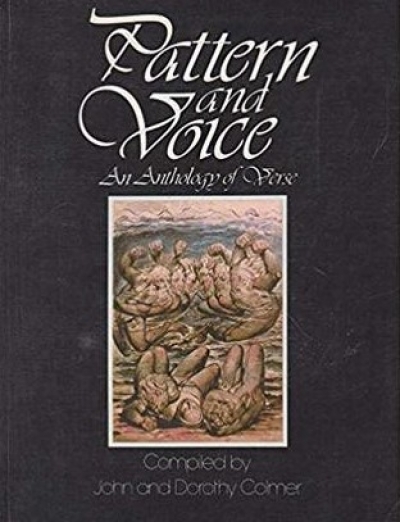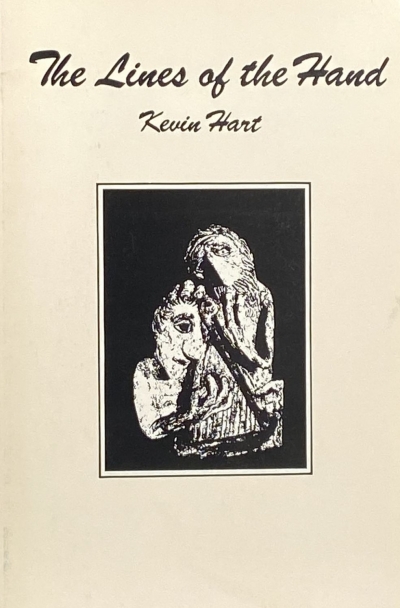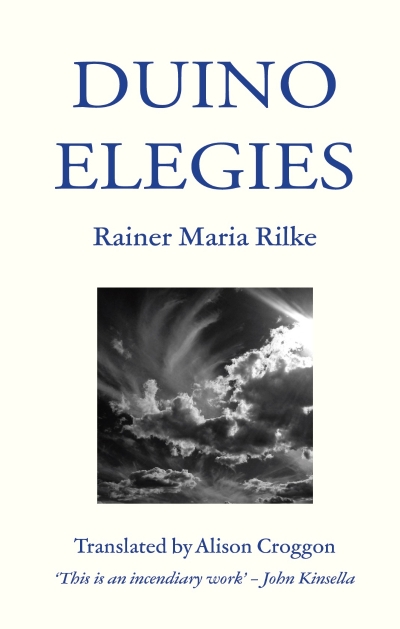Poetry
The Observatory: Selected poems by Dimitris Tsaloumas, translated by Philip Grundy
Migrant writing in this country isn’t just burgeoning, it has begun to flourish. The writing itself and the study of it begin to look like a ‘growth industry’. What I know of it is varied both in kind and quality, but I’ve no doubt at all that the poetry of Dimitris Tsaloumas is an important achievement by any standard.
... (read more)It is usually true to say that poetry is difficult and criticism easy. In the present case, I am not sure that this is quite so true. What can any critic sensibly say about the present batch of books which range from Bruce Dawe ‘s Collected Poems 1954–1978, Sometimes Gladness, to reprints of minor colonial verse and includes the gentle nature mysticism of John Anderson’s The Blue Gum Smokes a long Cigar, reverently illustrated by Ned Johnson and produced by Rigmarole of the Hours, and the ambitious regionalism of the two books of Hunter Valley Poets, IV and V, edited by Norman Talbot?
... (read more)Hazel Smith’s ecliptical features an image of a Sieglinde Karl-Spence work of art, ‘Becoming’, a pair of ‘winged feet woven with allocasuarina needles’. It is a striking image, evocative of Mercury, with one foot resting on the other, as if the right foot’s instep is itchy. The idea of ‘itchy feet’ is something that ties ecliptical to Alison Flett’s Where We Are. Flett and Smith are both migrants to Australia; their poetry is sensitive to its site of writing, and to international and interpersonal connections.
... (read more)languish by Marion May Campbell & And to Ecstasy by Marjon Mossammaparast
The title of Marion May Campbell’s third poetry collection, languish, conjures ideas of laziness, daydream, failure to make progress, ennui, lack of enthusiasm, anhedonia. Campbell’s poetry is concerned with the excitement of language, but also its debasement. Several reviewers have commented on the work’s intertextuality (Campbell often employs compositional strategies such as parody, allusion, calque). Always the audience or reader is integral to shaping the text. For Campbell, importantly, the unsaid or unquestioned are as important as collaged lyric or contemporary language trace, as seen in these lines from the first poem in the collection, ‘speechless’:
... (read more)The Language in My Tongue: An anthology of Australian and New Zealand poetry edited by Cassandra Atherton and Paul Hetherington
There’s an old Irish saying: ‘If you want praise, die. If you want blame, marry.’ I could add from personal experience, ‘If you really want blame, edit a poetry anthology.’ While poetry is relatively popular, it often seems that more people write it than read it. As a result, poets can be desperate for affirmation and recognition, managing their careers more jealously than investment bankers. What too often gets lost in all the log-rolling and back-scratching is the poetry. We turn to anthologies for help, hoping to find in small, palatable doses good poets we can choose to read in depth. We find anthologies representing nations or geographical regions, literary periods, ethnicities, genders and sexual orientations, forms, categories like postmodernism, post-colonialism, eco-poetry, and themes like love or madness.
... (read more)‘Every sacred language,’ writes Octavio Paz, ‘is secret. And conversely: every secret language … borders on the sacred.’ In the liminal Pyre, poet Maureen Alsop traverses – and erodes – this secret/sacred border, which is also the border of life and death, ‘the valley between our language’ (‘North Channel’). Each of the book’s section titles is a variation on ‘Selenomancy’, defined on the contents page as ‘a divination by the observation of the phases and appearances of the moon’. That Alsop titles multiple poems ‘Sky An Oar’, moreover, betrays the purpose of these divinations: to reach the other side, the ‘village across the waters’ that ‘burned all night’ (‘Witness’). The collection’s challenge, which it mostly meets successfully, is to remain on the compelling side of hermeticism.
... (read more)John and Dorothy Colmer have produced Pattern and Voice (Macmillan, $10.95 pb, 234 pp), an anthology of verse which will be of interest to all teachers and students of poetry. It has a blend of classic and contemporary poetry and includes many Australian poets.
... (read more)In an increasingly secular age, The Lines of the Hand is an unusual book. Almost half of the poems it contains are direct communications with an evident and accessible God, while others are celebrations of Creation.
... (read more)The art of poetry is alive and well in New Zealand in the 1980s. In spite of the economic recession which has decimated literary journals and made the publication of poetry more than ever a dubious commercial proposition, in terms of both quality and quantity New Zealand poetry has probably never been stronger. There are a number of factors contributing to this situation. One is that, leaving aside isolated colonial precursors, poetry as a continuous history in New Zealand is a relatively recent affair going back only fifty or sixty years. Consequently, the stream has become broader and deeper with each passing decade, and yet the beginnings of the tradition are still (as it were) concurrent through the survival and continued activity of poets such as Allen Curnow, now in his seventies, who published his first book fifty years ago. There are in the 1980s poets active from every subsequent generation which has fed into the stream: poets from the 1940s (Louis Johnson, Kendrick Smithyman, Alistair Campbell), poets from the 1950s (Ruth Dallas, W.H. Oliver, C.K. Stead), poets from the 1960s (Vincent O’Sullivan, Hone Tuwhare. Michael Jackson), poets from the 1970s (Sam Hunt, Bill Manhire, Ian Wedde), and finally poets who have emerged within the last few years (Meg Campbell, Keri Hulme, Cilla McQueen), to mention only representative names.
... (read more)Duino Elegies by Rainer Maria Rilke, translated by Alison Croggon
Rainer Maria Rilke’s Duino Elegies were begun in a burst of inspiration while he was staying at Duino Castle near Trieste in 1912. Walking along the battlements after receiving a difficult business letter, he heard a mysterious voice calling to him from an approaching storm. Their composition was then interrupted by a personal and artistic crisis that lasted until 1922, when he finished them in an even more astonishing afflatus which also included the gift of their companion-masterpiece, the Sonnets to Orpheus, at the Château de Muzot in Switzerland.
... (read more)
